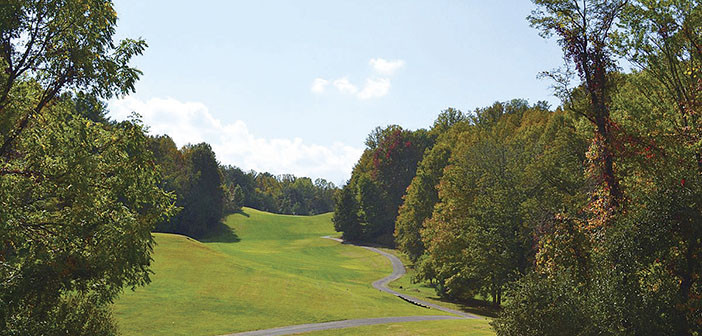By Gary Gray
Years of losses at Johnson City’s Buffalo Valley Golf Course and mounting subsidies needed to keep it afloat have resulted in a serious discussion about what to do with the municipal facility in Unicoi County.
City commissioners and city officials last week began fleshing out the cause and cure for falling revenues amounting to $300,000 to $400,000 annually, and possible actions regarding the course during a nearly two-hour workshop.
City Manager Pete Peterson pointedly remarked to media members that it was, in fact, merely a workshop, that no vote on Buffalo Valley’s fate was forthcoming any time soon and that both Buffalo Valley and Pine Oaks golf courses are fully funded through this fiscal year.
“I know there’s a lot of anxiety that the City Commission has already determined Buffalo Valley’s fate, but we are only at the informational stage,” he said.
Nonetheless, five options are now on the table, including the sale of the property through a brokerage firm.
Assistant City Manager Charlie Stahl offered the following options for consideration: Continue to own and operate and reinvest in the course; enter into discussions with the Town of Unicoi about a lease/purchase agreement; consider an agreement with a national golf course management firm; sell the course through a brokerage firm specializing in golf courses, or terminate operations and maintain the property until its future is determined.
“We have talked with two national golf course management companies,” Stahl said. “The city likely would be responsible for covering capital costs in that situation.”
Peterson began the session by stating Buffalo Valley was “operating on a shoe string (budget).”
“From day one, we were continually scrambling to get activity at and around the golf course,” he said. “We bought enough equipment to get going, but we never made enough money to make upgrades. It’s been in a deficit position from the start. At the same time, we spend a lot of money on things like Senior Services and Parks and Recreation, but it’s a quality-of-life issue.”
Golf Director Jim Hughes, who has always championed the Buffalo Valley course and the need for golf in general, admitted rounds of play purchased has been declining. But he also said the “wavering opinion” of what might happen to the course has affected memberships and the number of rounds played.
The average round of golf at Buffalo Valley and Pine Oaks is about $30.
“Does it make sense to close Buffalo Valley, or would we be creating a bigger problem?” Commissioner Ralph Van Brocklin asked Hughes.
“My thought is the latter,” Hughes responded.
Currently, Mayor David Tomita and Commissioner Todd Fowler have stated they believe municipal golf courses provide no benefit if operated outside the city limits. Commissioner Joe Wise made his concerns very clear on more than one occasion.
“We have twice as many golf courses (since Buffalo Valley came online about 25 years ago) and half as many rounds being played,” Wise said. “I would rather do one thing well than two things mediocre.”
Wise also asked if the city’s Golf Advisory Board has been asked to consider Buffalo Valley’s viability. Its members have not – at least not yet.
The city purchased the course for about $1.5 million when the Internal Revenue Service procured the property from a private owner. The city has invested more than $5 million in Buffalo Valley overall, and picked up about $1.4 million over the past five years to help make ends meet.
Buffalo Valley’s latest reported fixed assets – its worth, including land, improvements and equipment – is just over $2.7 million, according to a chart provided by Stahl. The land value is listed at about $665,000.
“Supply and demand are out of whack,” Peterson said. “Things have changed. People have less time. There was a plan for a ‘golf community’ in the Boones Creek area, but about the same time, Buffalo Valley became available and we got it at a heavily discounted price. The thought at the time was that was a logical growth area. Soon after, the Town of Unicoi incorporated, which stifled plans for the city’s growth in that area.”
Vice Mayor Jenny Brock, an avid golfer, agreed that things have changed.
“I think we’re faced with a number of factors, including a changing demographic,” she said. “We need to look at how we can get out in front. We have a huge millennial population, but they don’t necessarily like to go spend four hours at the golf course under what is now an old model.”
In June, as commissioners neared a second of three readings of its $245 million fiscal 2018 budget, the possible repositioning of golf from an enterprise fund to an item in the general fund was halted until a workshop, such as the one held last week, could be put together.
An enterprise fund is designed to make money, but that money – by state law – must go toward operational costs. The general fund includes basic services, such as police, fire and public works – in other words, essential services.
Tomita has expressed concern that moving golf into the general fund would “lump it into the mass” and make its operations and financing less manageable.
There is no set date on which another workshop will be held.




